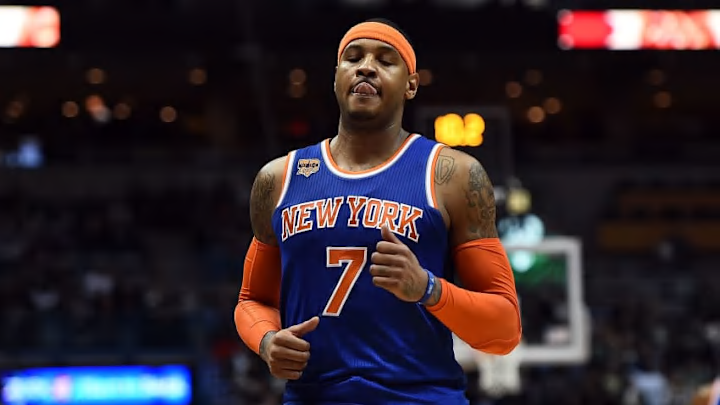A split would be mutually beneficial, but a no-trade clause doesn’t mean that Carmelo Anthony or the New York Knicks owe each other a trade.
When discussing New York Knicks small forward Carmelo Anthony, no words are referenced quite as often as, “No-trade clause.” The NTC in his five-year contract has become the most nauseatingly omnipresent topic in New York sports.
As the debate rages about what Anthony and the Knicks should do to resolve the issue of the no-trade clause, however, a misinterpretation has spread across the NBA world.
A no-trade clause enables a player to decline any package that art doesn’t want to be a part of. In other words: If Team X were to propose a trade for Anthony, and the Knicks were to accept, the deal wouldn’t end there.
The final say on the offer would belong to Anthony, who could either accept a trade out of New York or decline the proposal.
That much is well-documented and well-known—more so in New York City than anywhere else. The Anthony trade rumors have persisted for months on end, yet he’s still with the Knicks in early August.
While some may be growing frustrated with Anthony’s unwillingness to waive his no-trade clause, it’s crucial to note that it’s the organization that gave it to him.
When former team president Phil Jackson re-signed Carmelo Anthony in 2014, he included a no-trade clause in the contract. That was a mishap by the front office, as it handed autonomous power to a player.
Since then, every issue that the organization has experienced on the Anthony front can be traced back to Jackson’s contractual commitment.
Had he not given Anthony the NTC, the Band-Aid would have been ripped off long ago.
Furthermore, current president Steve Mills was in office as general manager when the contract was written. Thus, the blame for the current mess carries over from the Jackson regime to the current administration.
While some may want to see Anthony traded, he’s simply exercising the right that was granted to him in the contract he signed three long years ago.
In that same breath, what’s being lost in translation is that a no-trade clause isn’t an, “OK, now I’m ready to be traded,” clause.
Anthony reportedly has his heart set on joining the Houston Rockets. It’s a possibility that the front office has explored, but it failed to gain traction due to Houston’s limited number of appealing assets.
In turn, fans—and some media members—have helped weave the narrative that New York is doing wrong by Anthony.
Anthony faced poor working conditions under Jackson’s reign, and there’s no rational way around that fact. If we’re looking at this in a black and white manner, however, then the front office has the same right afforded to it as Anthony.
While Anthony can decline any trade package that he doesn’t want to be a part of, the Knicks can decline to include him in any trade proposal it creates.
It may not be pretty or, “Fair,” but it’s the nature of the business. Carmelo Anthony and the New York Knicks have created this mess together, and both will face the consequences until a resolution is unsurfaced.
Unless Anthony expands his list of preferred destinations, or the Knicks accept a lackluster trade package, the penalty will be staying together for at least one more season.
Anthony has no obligation to expand that list of preferred destinations. New York has no obligation to accept a trade that won’t help improve its future.
Must Read: Five reasons to love the Ramon Sessions signing
The situation is ugly, but it’s both Carmelo Anthony and the New York Knicks who are responsible for the stalemate.
